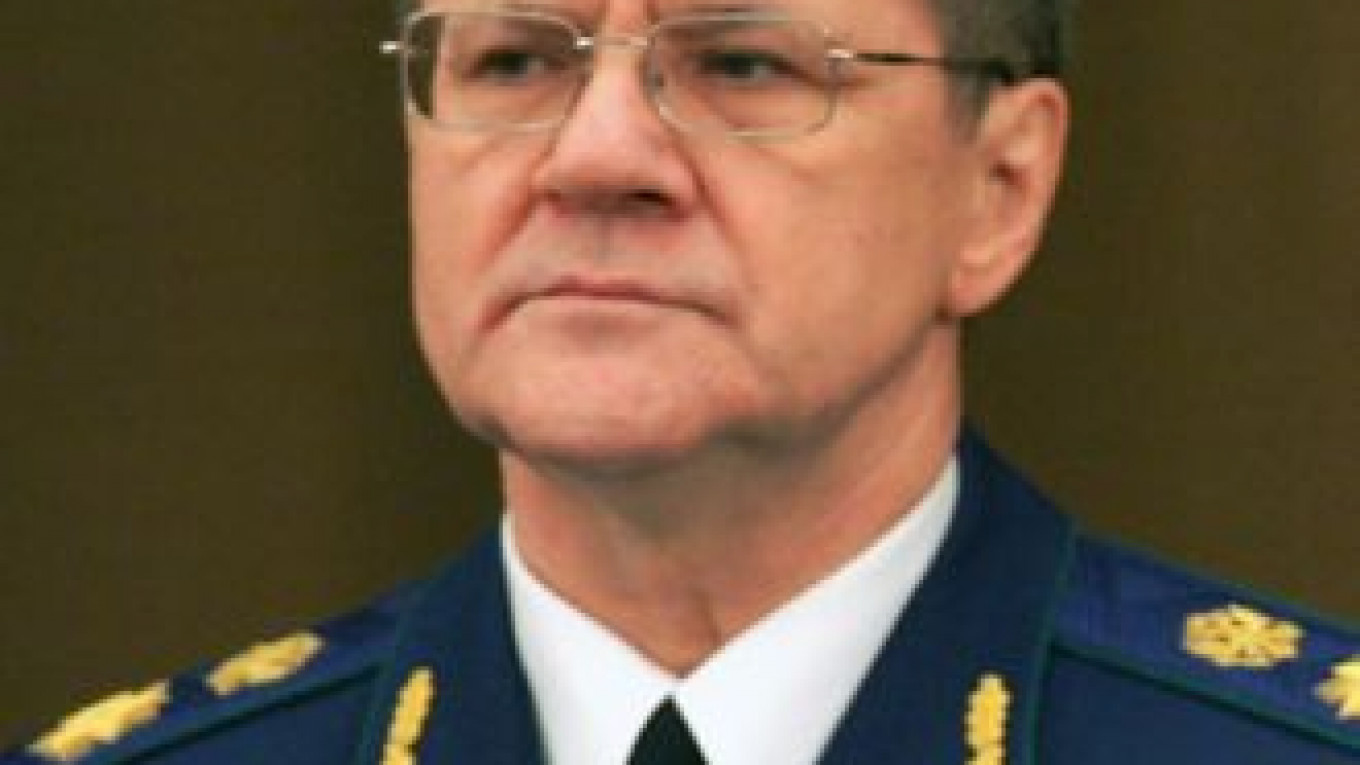Prosecutor General Yury Chaika promised to shake up his staff as he was appointed to a new five-year term by the Federation Council on Wednesday.
But Kremlin insiders and an analyst predicted that Chaika would lose his job after the March presidential election in connection with a losing turf war that the prosecutor's office is waging with the Investigative Committee.
The re-appointment was expected, because Chaika, 60, was nominated earlier this month by President Dmitry Medvedev, who enjoys the unquestioned support of the Federation Council. The senators voted 128-5 to keep Chaika in the job, Interfax said.
"I voted in favor of Chaika because I know him as a very professional man," Senator Aslambek Aslakhanov said by telephone.
"There have been some questions regarding him, but serious investigations have not proved any of the allegations," he said.
Aslakhanov was referring to a gambling ring scandal in the Moscow region that has led to the dismissal of several local prosecutors. The crackdown was initiated by the Investigative Committee, which accused local prosecutors of offering protection to a chain of illegal casinos in exchange for perks.
In his speech to the Federation Council on Wednesday, Chaika conceded that the scandal had prompted his agency to "think things over."
"We're doing some soul-searching right now," he , according to RIA-Novosti. "I think staff rotations will become ubiquitous."
Forty prosecutors were fired for various violations in 2010 alone, Chaika added.
He also fired back at the Investigative Committee, saying it enjoys too wide powers at the expense of the prosecutors. "The investigator is there for the prosecutor, not the other way around," Chaika said.
The Investigative Committee, which handles inquiries into serious crimes such as murder and large-scale fraud, was created in 2007 as part of the Prosecutor General's Office. Medvedev separated the two agencies in January.
Investigative Committee head Alexander Bastrykin is believed to be a staunch supporter of Prime Minister Vladimir Putin, the other half of the country's "ruling tandem." Putin and Medvedev insist there are no tensions in the tandem, but Medvedev said recently that they would not run against each other for president.
The Investigative Committee has said the gambling case was in the works for some time even though it only cracked down on prosecutors in February. It has attempted to charge and arrest a swath of local prosecutors and even implicated Chaika's son, Artyom Chaika, as a middleman between the prosecutors and casino management.
Medvedev chided both agencies for bringing the case into the open last spring. Investigators have not mentioned Chaika's son since, but they have continued to press ahead with their cases against half a dozen prosecutors, some of whom have been detained or fled the country.
Medvedev intends to dismiss Chaika over the scandal but does not want to do so before the March presidential election because that would weaken the Prosecutor General's Office, Vedomosti Wednesday, citing several unidentified Kremlin insiders.
Political analyst Iosif Diskin, who sits on the Public Chamber, said Chaika's shaky position was due to corruption problems within his office, not tensions in the ruling tandem.
Chaika likely convinced Medvedev to reappoint him by promising to shakeup the prosecutor's office, Diskin said by telephone.
"It's hard to believe that he would get nominated otherwise after the total annihilation of Moscow Regional Prosecutor's Office," he said.
A Message from The Moscow Times:
Dear readers,
We are facing unprecedented challenges. Russia's Prosecutor General's Office has designated The Moscow Times as an "undesirable" organization, criminalizing our work and putting our staff at risk of prosecution. This follows our earlier unjust labeling as a "foreign agent."
These actions are direct attempts to silence independent journalism in Russia. The authorities claim our work "discredits the decisions of the Russian leadership." We see things differently: we strive to provide accurate, unbiased reporting on Russia.
We, the journalists of The Moscow Times, refuse to be silenced. But to continue our work, we need your help.
Your support, no matter how small, makes a world of difference. If you can, please support us monthly starting from just $2. It's quick to set up, and every contribution makes a significant impact.
By supporting The Moscow Times, you're defending open, independent journalism in the face of repression. Thank you for standing with us.
Remind me later.






